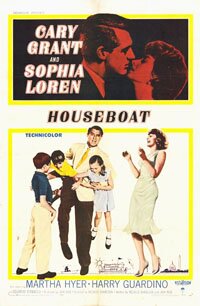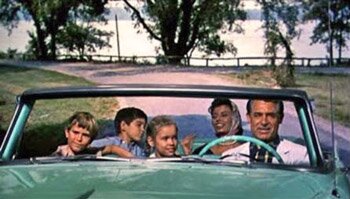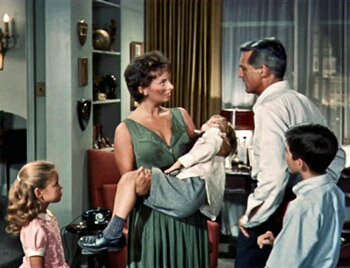 Directed by Melville Shavelson
Directed by Melville Shavelson
In the late 1950s and early 1960s family fare was certainly not what it is today. Particularly in movies. Houseboat is an example of the kind of family movie that was coming out then, but not of these films at their best.
Perhaps family fare is not the right phrase. What these films did was to insert children as an element into romantic comedies. So the films are really adult films that appear to be family oriented due to the presence of children. (Adult films in that period’s sense, not today’s.)
In other words, they are made for adults, not children (though children may enjoy them).
The movie is a bit lame, though it’s hard to say just why. Probably because a number of failed elements contribute to it. Cary Grant and Sophia Loren don’t seem to combine well, at least not in this kind of film. The script is weak relying as it does on a number of conventional film situations. And the directing is a bit pedestrian.
Individually, none of these elements is particularly poor. They’re just not good. But because all of them are weak, the movie falls flat.

Cary Grant plays a poor excuse of a father who, following the death of his wife, decides it’s time to take charge of his children and become a real parent. But he knows nothing of children and nothing of parenting. In a romantic comedy, this means “hi-jinks ensue.”
Sophia Loren is the daughter of an orchestra leader. She is tired of her life and restless with a world of stilted sophistication. She’s visceral rather than cerebral and wants to enjoy life.
So she leaves the life she’s living and comes upon one of Grant’s sons, whom she befriends.
Later, Grant hires her as a kind of nanny for his children, thinking she is poor, and seeing his children have an affection for her.
A romance develops and so on and so forth.
I think the movie fails because it really wants to be an urbane romantic comedy. But the element of children and parenting keeps throwing it off as this lends itself more to slapstick. Or perhaps it’s the opposite: a family movie thrown off by the element of adult romantic comedy. Either way, the movie doesn’t know what it wants to be. It treads water between the two.
Compare this to Father Goose, which is a much more likable, better executed film that manages the element of children and adult romance so very well. Perhaps one of the reasons it works is because it reverses the roles of the leads.

In Houseboat, the obvious choice is made of Grant as the sophisticated, stiff character and Loren as the more down to earth role.
Father Goose reverses this: it is Grant who is earthy and visceral and his co-lead, Leslie Caron, is the stuffed shirt. This allows Grant to make use of his comedic skills, especially his facial expressions, as well as his wonderful acting abilities to carry the movie.
Houseboat seems to rely more on the attractiveness of Grant and Loren to carry the film, and it just isn’t enough.
Despite this, I enjoyed Houseboat but less for the movie itself than for the sight of Cary Grant and Sophia Loren on screen together. But the truth is, both actors are so much better than the script allows them to be. Overall, it’s a huge waste of talent.
On Amazon:
- Houseboat (1958) — Video on Demand
- Houseboat (1958) — DVD, Amazon.com (U.S.)
- Houseboat (1958) — DVD, Amazon.ca (Canada)


